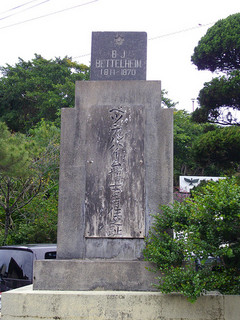Bernard Jean Bettelheim was a Protestant missionary who resided in Naha from 1846 to 1854. He is credited with producing the first Okinawan-English dictionary, and the first translation of the Bible into Okinawan. He appointed himself translator for Commodore Matthew Perry during Perry's time in the Ryûkyû Kingdom, and proved himself a nuisance to both Perry and the kingdom's officials; the latter regularly denied his requests to meet with them, and found his proselytizing efforts troublesome and obnoxious.
Bettelheim was born the son of a rabbi in Hungary. He later moved to England, married an Englishwoman and converted to Christianity, joining a Hong Kong-based operation dedicated to proselytizing to the Jewish community.
In 1846, he traveled to Okinawa, along with his family. Christianity was banned in the kingdom at that time, and though initially harbor authorities denied his requests to disembark, he ultimately tricked them into allowing him on land, and then refused to return to the ship. Bettelheim discovered the Buddhist temple of Gokoku-ji a short distance from the shore, and forcibly took over the temple, throwing out the monks, along with Buddhist sculptures and anything else he deemed pagan. He then proceeded to make the temple his home for the next seven years.
During that time, he managed to keep the monks and other Ryukyuan authorities out of the temple, and engaged in various efforts to proselytize to the people of Naha, despite the government's efforts to stop him. He would break into private homes to preach to the people, and would scatter pamphlets in the marketplaces and public streets, followed by agents of the government, who would gather them up and take them away. Being a medical doctor as well, he often also provided inoculations and did rounds, visiting locals' homes and providing medical assistance, for which he gained a degree of popularity among the locals; some took to calling him "Naminoue no megane" ("the eyeglasses of Naminoue").[1]
Bettelheim threatened on numerous occasions to contact the British authorities, and to bring down the Royal Navy on the kingdom if the Ryukyuan government didn't accede to him whims; the Brits, for the most part, however, wanted to have nothing to do with him. The royal government petitioned Western crews on numerous occasions, including that of Commodore Perry, to take him away, but every time, Bettelheim, serving as interpreter, roundly refused to go; the foreign crews often refused responsibility for the man, not being British crews.
When Commodore Perry arrived in Naha in 1853, Bettelheim appointed himself interpreter for the Americans, and pressed upon Perry that he take action against the Ryukyuan government, which had so mistreated him over the years. The Commodore, for the most part, refused, but used Bettelheim as his interpreter in his various meetings with the Ryukyuan regent. He agreed to send a number of things back to Shanghai for Bettelheim, including letters and $800 to be deposited into his bank accounts; Perry also claimed a portion of the Gokoku-ji grounds to use as pasture for sheep he brought with him to Okinawa, while Bettelheim preached to the American crewmen.
Bettelheim was finally taken away, to the great relief of the royal government, by Commodore Perry on his second visit to the islands, in 1854. Despite Bettelheim's horrible behavior, utter and complete lack of respect for Okinawan or Japanese culture and political authority, destruction of sacred objects, etc., a monument was constructed in his memory at the Gokoku-ji in 1926.
References
- Okinawa rekishi jinmei jiten 沖縄歴史人名事典. Okinawa bunkasha, 2002. p69.
- ↑ Gokoku-ji was located adjacent to Naminoue Shrine, so he was associated with that area.
